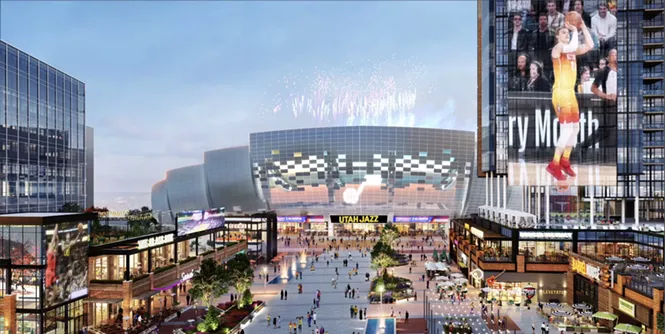CAPITOL HILL—Salt Lake City has 10 years to prepare for a likely Olympic Games in 2034, and on Friday state lawmakers kicked things off by passing a bill that could lead to a new arena for the Utah Jazz, a professional hockey franchise and, potentially, reconstructions of downtown landmarks like the Salt Palace and Abravanel Hall.
Bipartisan majorities in both legislative chambers voted to approve SB272, which allows Salt Lake City to establish a “city revitalization zone,” supported by a 0.5 percent increase in the city’s sales tax. The effort would also leverage considerable private investment from entities such as the Smith Entertainment Group (SEG), which owns the Jazz, and the Church of Jesus Christ of Latter-day Saints, which owns several key properties in the center -city.
“Hockey and basketball are part of it, but that’s where the focus really is: rebuilding our downtown,” said House Speaker Mike Schultz, R-Hooper.
The vote came shortly after the passage of companion legislation creating a land use district around the State Fairpark and Power District, which will redevelop Rocky Mountain Power’s sprawling campus in the west Poplar Grove neighborhood . The region is expected to benefit from approximately $3 billion in private investment from the Larry H. Miller Group of Companies, which is actively seeking to bring Major League Baseball to the state.
“It pays for itself,” Schultz said. “If baseball doesn’t show up, the money won’t come. If baseball shows up, baseball pays for baseball.
In a joint statement released Friday, Salt Lake City Mayor Erin Mendenhall, Salt Lake County Mayor Jenny Wilson, and SEG’s Ryan and Ashley Smith said the state has a “major opportunity” to reimagine the city center and that future plans would seek to generate a vibrant neighborhood. and a fully activated downtown connecting amenities such as jazz plays, Broadway productions, concerts and the anticipated Winter Olympics.
“A thriving state needs a thriving downtown in its capital,” the release said. “With today’s passage of the Capital Reinvestment Zone bill, we are ready to invest deeply in the downtown Salt Lake City experience. »
The two sports district proposals capped this year’s 2024 legislative session, which began in mid-January and opened with contentious debates around use of public restrooms by transgender people and banning diversity, equity and inclusion, or DEI, programs.
Those efforts have faced opposition from Democratic members of the House and Senate, with House Minority Leader Angela Romero suggesting last week that the 2024 session be postponed. among the most partisan she has ever seen.
“Who’s really going to want to come to Utah?” » said Romero. “I see some of the bills that come before us and it really scares me.”
Romero noted that while his caucus disagrees with his Republican colleagues’ tougher proposals, he also values the good working relationship with House leadership. And Schultz echoed that sentiment Friday, saying representatives were trying to maintain a collaborative approach even as they represented the wants and needs of different constituent groups.
“We try to be open, we try to be fair,” Schultz said. “You look at the majority of bills passed this year and most of them were bipartisan.”
Without specifically referencing the bathroom and DEI bill, Schultz said he was comfortable with the laws that came out of the legislative deliberations.
“I think the majority of Utahns like the bills we passed,” Schultz said.
Schultz praised the work of lawmakers in addressing many of the state’s priorities regarding water, housing, energy and transportation. He noted that the state faces a housing shortage that has driven up costs, and said lawmakers’ work this year will encourage cities to allow more housing to be built, while helping developers assess labor, material and infrastructure costs. slowed down the progress of the projects.
“Now they will have more tools in their toolbox to meet the needs of the state,” Schultz said.
He also defended lawmakers’ decision to clarify that elected officials’ daily schedules are not subject to public records requests. Utah news organizations are currently engaged in litigation and seeking to secure Attorney General Sean Reyes’ schedule, but Schultz said the long-standing intent of the law was to protect these types of materials from the public examination.
He said recording requests were submitted not only for past calendars but also for future calendars, creating a scenario in which a lawmaker’s location is known to bad actors, without the assistance of security personnel .
“Some of the women in our corps receive the highest number of death threats,” Schultz said. “It’s a safety issue and it’s important.”
The 2024 legislative session officially ends Friday at midnight. This article will be updated.


